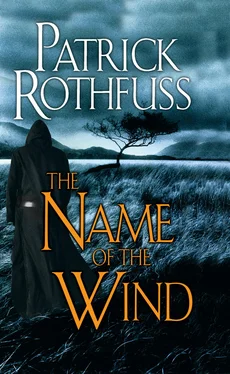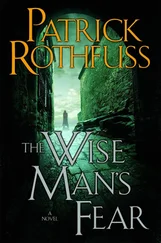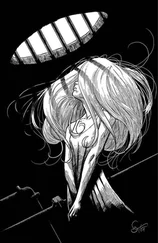Kote and Bast watched for a moment, then moved smoothly into action. Kote smiled and began pouring drinks. Bast darted outside to see if there were horses that needed stabling.
In ten minutes the inn was a different place. Coins rang on the bar. Cheese and fruit were set on platters and a large copper pot was hung to simmer in the kitchen. Men moved tables and chairs about to better suit their group of nearly a dozen people.
Kote identified them as they came in. Two men and two women, wagoneers, rough from years of being outside and smiling to be spending a night out of the wind. Three guards with hard eyes, smelling of iron. A tinker with a potbelly and a ready smile showing his few remaining teeth. Two young men, one sandy-haired, one dark, well dressed and well-spoken: travelers sensible enough to hook up with a larger group for protection on the road.
The settling-in period lasted an hour or two. Prices of rooms were dickered over. Friendly arguments started about who slept with whom. Minor necessities were brought in from wagons or saddlebags. Baths were requested and water heated. Hay was taken to the horses, and Kote topped off the oil in all the lamps.
The tinker hurried outside to make use of the remaining daylight. He walked his two-wheel mule cart through the town’s streets. Children crowded around, begging for candy and stories and shims.
When it became apparent that nothing was going to be handed out, most of them lost interest. They formed a circle with a boy in the middle and started to clap, keeping the beat with a children’s song that had been ages old when their grandparents had chanted it:
“When the hearthfire turns to blue,
What to do? What to do?
Run outside. Run and hide.”
Laughing, the boy in the middle tried to break out of the circle while the other children pushed him back.
“Tinker,” the old man’s voice rang out like a bell. “Pot mender. Knife grinder. Willow-wand water-finder. Cut cork. Motherleaf. Silk scarves off the city streets. Writing paper. Sweetmeats.”
This drew the attention of the children. They flocked back to him, making a small parade as he walked down the street, singing, “Belt leather. Black pepper. Fine lace and bright feather. Tinker in town tonight, gone tomorrow. Working through the evening light. Come wife. Come daughter, I’ve small cloth and rose water.” After a couple of minutes he settled outside the Waystone, set up his sharpening wheel and began to grind a knife.
As the adults began to gather around the old man, the children returned to their game. A girl in the center of the circle put one hand over her eyes and tried to catch the other children as they ran away, clapping and chanting:
“When his eyes are black as crow?
Where to go? Where to go?
Near and far. Here they are.”
The tinker dealt with everyone in turn, sometimes two or three at a time. He traded sharp knives for dull ones and a small coin. He sold shears and needles, copper pots and small bottles that wives hid quickly after buying them. He traded buttons and bags of cinnamon and salt. Limes from Tinuë, chocolate from Tarbean, polished horn from Aerueh. . . .
All the while the children continued to sing:
“See a man without a face?
Move like ghosts from place to place.
What’s their plan? What’s their plan?
Chandrian. Chandrian.”
Kote guessed the travelers had been together a month or so, long enough to become comfortable with each other, but not long enough to be squabbling over small things. They smelled of road dust and horses. He breathed it in like perfume.
Best of all was the noise. Leather creaking. Men laughing. The fire cracked and spat. The women flirted. Someone even knocked over a chair. For the first time in a long while there was no silence in the Waystone Inn. Or if there was, it was too faint to be noticed, or too well hidden.
Kote was in the middle of it all, always moving, like a man tending a large, complex machine. Ready with a drink just as a person called for it, he talked and listened in the right amounts. He laughed at jokes, shook hands, smiled, and whisked coins off the bar as if he truly needed the money.
Then, when the time for songs came and everyone had sung their favorites and still wanted more, Kote led them from behind the bar, clapping to keep a beat. With the fire shining in his hair, he sang “Tinker Tanner,” more verses than anyone had heard before, and no one minded in the least.
Hours later, the common room had a warm, jovial feel to it. Kote was kneeling on the hearth, building up the fire, when someone spoke behind him.
“Kvothe?”
The innkeeper turned, wearing a slightly confused smile. “Sir?”
It was one of the well-dressed travelers. He swayed a little. “You’re Kvothe.”
“Kote, sir,” Kote replied in an indulgent tone that mothers use on children and innkeepers use on drunks.
“Kvothe the Bloodless.” The man pressed ahead with the dogged persistence of the inebriated. “You looked familiar, but I couldn’t finger it.” He smiled proudly and tapped a finger to his nose. “Then I heard you sing, and I knew it was you. I heard you in Imre once. Cried my eyes out afterward. I never heard anything like that before or since. Broke my heart.”
The young man’s sentences grew jumbled as he continued, but his face remained earnest. “I knew it couldn’t be you. But I thought it was. Even though. But who else has your hair?” He shook his head, trying unsuccessfully to clear it. “I saw the place in Imre where you killed him. By the fountain. The cobblestones are all shathered.” He frowned and concentrated on the word. “ Shattered . They say no one can mend them.”
The sandy-haired man paused again. Squinting for focus, he seemed surprised by the innkeeper’s reaction.
The red-haired man was grinning. “Are you saying I look like Kvothe? The Kvothe? I’ve always thought so myself. I have an engraving of him in back. My assistant teases me for it. Would you tell him what you just told me?”
Kote threw a final log onto the fire and stood. But as he stepped from the hearth, one of his legs twisted underneath him and he fell heavily to the floor, knocking over a chair.
Several of the travelers hurried over, but the innkeeper was already on his feet, waving people back to their seats. “No, no. I’m fine. Sorry to startle anyone.” In spite of his grin it was obvious he’d hurt himself. His face was tight with pain, and he leaned heavily on a chair for support.
“Took an arrow in the knee on my way through the Eld three summers ago. It gives out every now and then.” He grimaced and said wistfully, “It’s what made me give up the good life on the road.” He reached down to touch his oddly bent leg tenderly.
One of the mercenaries spoke up. “I’d put a poultice on that, or it’ll swell terrible.”
Kote touched it again and nodded. “I think you are wise, sir.” He turned to the sandy-haired man who stood swaying slightly by the fireplace, “Could you do me a favor, son?”
The man nodded dumbly.
“Just close the flue.” Kote gestured toward the fireplace. “Bast, will you help me upstairs?”
Bast hurried over and drew Kote’s arm around his shoulders. Kote leaned on him with every other step as they made their way through the doorway and up the stairs.
“Arrow in the leg?” Bast asked under his breath. “Are you really that embarrassed from taking a little fall?”
“Thank God you’re as gullible as they are,” Kote said sharply as soon as they were out of sight. He began to curse under his breath as he climbed a few more steps, his knee obviously uninjured.
Bast’s eyes widened, then narrowed.
Читать дальше











